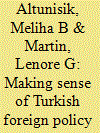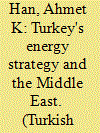|
|
|
Sort Order |
|
|
|
Items / Page
|
|
|
|
|
|
|
| Srl | Item |
| 1 |
ID:
108642


|
|
|
|
|
| Publication |
2011.
|
| Summary/Abstract |
Turkish-Israeli relations, which had reached the level of strategic cooperation by the end of the 1990s, started to decline after 2000 and Turkey's approach to Israel has changed considerably as a result of huge transformations in international, regional, and Turkish domestic politics. The Israeli Operation Cast Lead in December 2008-January 2009 and the "One Minute" incident at Davos in January 2009, however, initiated a continuous crisis situation, which reached its peak in the May-June 2010 Mavi Marmara crisis. This article aims to analyze the causes of change in the Turkish perception of Israel by focusing on three key factors: Justice and Development Party ideology and actors, power vacuum in the Middle East, and Turkish foreign policy discourse of grandeur.
|
|
|
|
|
|
|
|
|
|
|
|
|
|
|
|
| 2 |
ID:
108636


|
|
|
|
|
| Publication |
2011.
|
| Summary/Abstract |
This article aims at analyzing Turkey's economic relations with the Middle East during the 2000s. It argues that intensification of Turkey's economic relations with the region is due to the changes in the Turkish economy and the coming to power of the Adalet ve Kalk?nma Partisi (AKP). It looks at the relationship between the AKP and the business communities and foreign trade in general and elaborates on the trade figures and relations with individual countries. It looks at the economic cooperation projects and the vision presented by the Turkish policy-makers. The article also looks at the drawbacks and possible future developments in the economic relations.
|
|
|
|
|
|
|
|
|
|
|
|
|
|
|
|
| 3 |
ID:
108638


|
|
|
|
|
| Publication |
2011.
|
| Summary/Abstract |
For many years the world used to hear about the Partiya Karkeren Kurdistan (PKK) terrorist actions in Turkey. Recently, however, a new factor entered the scene with great force-a popular uprising which resembles in some ways the Palestinian intifada and the other uprisings which have taken place since the end of 2010 in Arab countries. In the Kurdish lexicon it is called serhildan. The fusion between well-organized guerrilla activities and an open national movement has brought the Kurdish problem in Turkey into its most crucial phase ever. This essay will analyze the immediate and deeper causes for the Kurdish problem in Turkey and assess its impact on the stability and security of Turkey itself and on Ankara's foreign relations as a whole. The essay's main argument is that only a peaceful solution is likely to pull the rug from under the PKK's feet, thus enabling Turkey to cut the Gordian knot that ties this problem with its foreign relations and prevent Ankara's outside partners from using the issue as a weapon against Turkish interests.
|
|
|
|
|
|
|
|
|
|
|
|
|
|
|
|
| 4 |
ID:
108634


|
|
|
|
|
| Publication |
2011.
|
| Summary/Abstract |
Employing the four categories of change as defined by Charles Hermann and the insight of Walter Carlsneas that the dynamic between structure and agency causally condition each over time, the article conceptualizes change in Turkish foreign policy under the AKP. This theoretical analysis of Turkey's foreign policy allows for the examination of the interplay of domestic actors with the regional and international systems including their economic, identity and security components. It also explores the impact Turkey's activism in the area has had in Turkey and among the people of the region. Finally, it raises key questions as to the future of Turkish foreign policy as the outcomes of the Arab Spring develop.
|
|
|
|
|
|
|
|
|
|
|
|
|
|
|
|
| 5 |
ID:
108641


|
|
|
| 6 |
ID:
108644


|
|
|
|
|
| Publication |
2011.
|
| Summary/Abstract |
Focusing on the Turkish Middle Eastern foreign policy from the perspective of European Union (EU)-Turkey relations, this paper argues that Turkey's recent activism and attractiveness in the region is attributable to its dual reform and accession process both of which are tied to the EU's anchoring role and leverage over the country. Turkey has self-consciously taken the advantage of its domestic transformation by emulating the EU in its own neighborhood policy. However, to the current stagnation of the accession process and the deepening of Turkey's domestic crisis is now added the new context of the Arab revolutionary movements. The central thesis of this paper, however, is that Turkish foreign policy and rising actorness in the Middle East should not be, solely driven by an interest-driven pragmatism. It should also seek a normative reconciliation with the EU and its process of enlargement.
|
|
|
|
|
|
|
|
|
|
|
|
|
|
|
|
| 7 |
ID:
108643


|
|
|
|
|
| Publication |
2011.
|
| Summary/Abstract |
In the last decade, the Gulf has emerged as an important focal point of Turkish foreign policy. The Arab Awakening, however, has unleashed powerful pressures for change throughout the Middle East and Gulf. The key question is what impact these pressures for change will have on Turkey's foreign policy toward the Gulf and the Middle East more broadly. Ankara's Gulf policy was predicated on the political status quo in the Gulf remaining largely intact. Can this policy still succeed? Or will it have to be redefined to deal with a new and highly dynamic strategic landscape?
|
|
|
|
|
|
|
|
|
|
|
|
|
|
|
|
| 8 |
ID:
108637


|
|
|
|
|
| Publication |
2011.
|
| Summary/Abstract |
This article examines Turkey's energy relations with the Middle East from a perspective of opportunities and limitations brought about by the structure of Turkey's general energy relations. As Turkish foreign policy and energy strategy become increasingly integrated, Turkish-Middle East energy relations offer a solid test case on the soundness and applicability of not only Turkey's energy strategy, but also for the success of Turkey's foreign policy during the last decade. Analyzing Middle East energy and the structure of Turkey's energy (im)balances, this article goes on to explore Turkey's energy relations with individual Middle East countries and questions the results achieved. While doing so, it also puts and evaluates Turkey's energy strategy within the context of Turkish foreign policy. It argues that as the result of diverse effects and influences of policies observed by Turkish officials, as well as an array of structural factors, the gains of Turkey's energy strategy and its future success remains questionable, while the case of energy strategy provides a telling case on the success of Turkish foreign policy.
|
|
|
|
|
|
|
|
|
|
|
|
|
|
|
|
| 9 |
ID:
108640


|
|
|
|
|
| Publication |
2011.
|
| Summary/Abstract |
During its final two centuries, the Ottoman Empire failed to introduce an "exit strategy" from the Middle East. On account of this uneasy disengagement, Republican Turkey turned back and followed an anti-revisionist policy toward the region. In the 1920s, the revolutionary leadership of the Turkish Republic focused on internal reformation and modernization programs, which made a structural transformation in domestic politics and systemic change that further forced Turkish governments not to pursue an active policy in the region. During the Cold War, Turkey's Middle East policy was not viewed as friendly toward the Middle East while there was a strong security ties with Iran, especially in Central Treaty Organization. However, Turkey followed a more aggressive and coercive entrance strategy toward the region by the end of the Cold War. The Justice and Development Party has made a shift and attempted to exercise soft power policies to normalize its relations with Arab nations and Iran by improving societal and economic interdependence relations. In order to understand the new activism in Turkish-Iranian relations, it is necessary to provide a historical context of the changing dynamic of regional politics by analyzing threat perceptions and security alignments from the perspective of developing Turkish-Iran relations.
|
|
|
|
|
|
|
|
|
|
|
|
|
|
|
|
| 10 |
ID:
108639


|
|
|
|
|
| Publication |
2011.
|
| Summary/Abstract |
This article deals with the impact on the political forces in the Arab World in general and in Syria in particular of the free, democratic and peaceful accession to power of the Justice and Development Party in Turkey. It further examines how Syrian political movements, especially political Islam, are trying to make sense out of these recent "revolutionary" political developments in Turkey and how they can be applied to the Syrian case.
|
|
|
|
|
|
|
|
|
|
|
|
|
|
|
|
| 11 |
ID:
108645


|
|
|
|
|
| Publication |
2011.
|
| Summary/Abstract |
The article situates Turkey's approach to the Middle East in a broader historical context, demonstrating that there is more continuity in Ankara's approach to the region than observers tend to believe. It also argues that specific domestic political, economic, and global patterns of politics are likely to produce a divergence between the USA and Turkey on critical Middle Eastern issues, notably the Israeli-Palestinian problem and Iran's drive for regional influence. In an unintended way, however, the Arab awakening may drive a greater confluence of interests between Washington and Ankara.
|
|
|
|
|
|
|
|
|
|
|
|
|
|
|
|
|
|
|
|
|